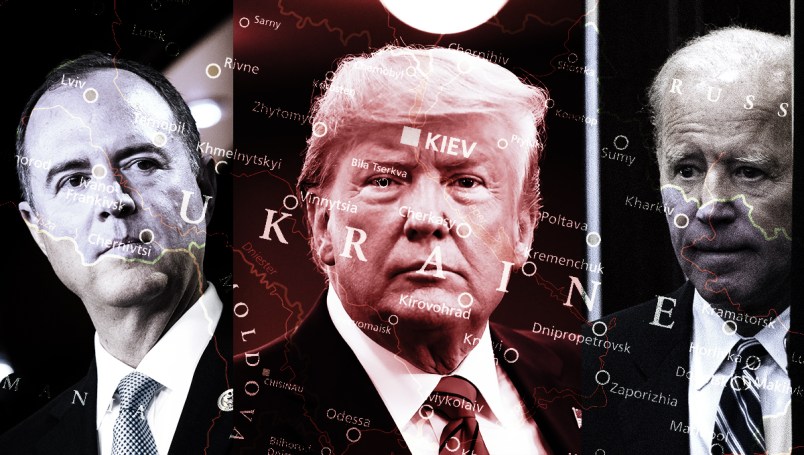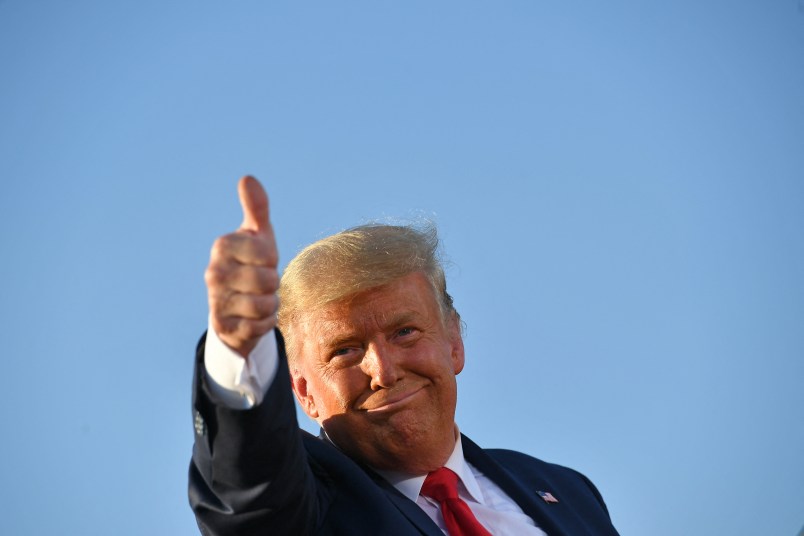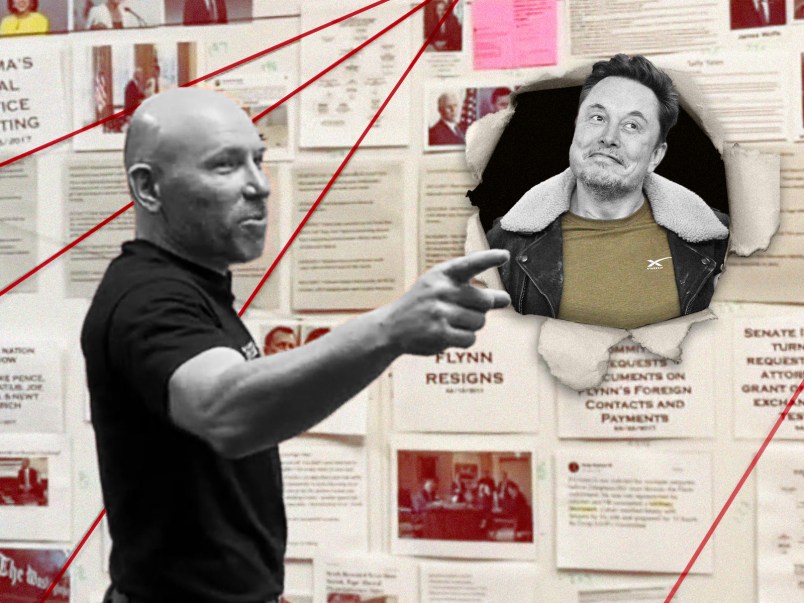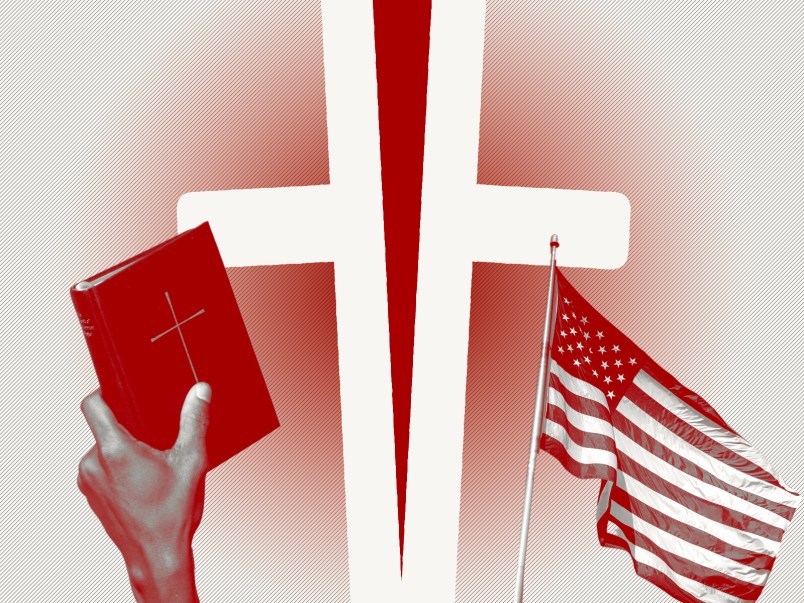This post was first published on Sept. 25, 2019, and updated regularly, most recently on Dec. 4.
The past few weeks have been a firestorm of new details concerning Trump’s pressure campaign to encourage Ukraine to create information that would help him in the 2020 election.
To truly understand the story, we need to go back a few years. Here’s how we got to where we are today.
RELATED READING: Who Has Testified In The Impeachment Probe So Far
February 2014: The Maidan Revolution ends with the ouster of pro-Putin Ukrainian president Viktor Yanukovych, whose administration was widely seen as corrupt. U.S. President Barack Obama later named then-Vice President Joe Biden his point man to handle the resulting Ukraine crisis.
May 13, 2014: Hunter Biden, Joe Biden’s son, joins the board of Burisma, then Ukraine’s largest private natural gas producer. The company is in the midst of a damage-control effort. Its owner, Mykola Zlochevsky, was a member of Yanukovych’s cabinet. Zlochevsky had served as minister of natural resources, and in that role awarded Burisma lucrative drilling licenses, leading to allegations of corruption and an investigation into those allegations by Ukrainian prosecutors.
Feb. 10, 2015: Viktor Shokin is appointed to a 13-month term as Ukraine’s prosecutor general, a role similar to the attorney general in the U.S.
Sometime in 2015: Corruption cases against Zlochevsky are “shelved by Ukrainian prosecutors in 2014 and through 2015,” according to Vitalily Kasko, a former deputy prosecutor general under Shokin who resigned in protest in February 2016.
Late 2015: Western allies of Ukraine grow frustrated with the sluggish pace of corruption investigations in the country. In a September speech, U.S. ambassador to Ukraine Geoffrey Pyatt slams the prosecutor general’s office for not releasing documents to British investigators on Burisma owner Zlochevsky. Instead of sending documents to the Brits, ambassador Geoffrey Pyatt says, “they sent letters to Zlochevsky’s attorneys attesting that there was no case against him. In a December speech to the Ukrainian parliament, Joe Biden says “corruption eats Ukraine like cancer.”
Early 2016: According to comments he would later make about this time, Biden threatens that the U.S. will withhold a billion-dollar loan guarantee from Ukraine unless Shokin resigns. Several outlets later report that the U.S. had been putting pressure on Ukraine to oust Shokin for months.
Feb. 10, 2016: International Monetary Fund Chief Christine Lagarde warns Ukraine that a $17.5 billion bailout fund overseen by her organization is in jeopardy. “Without a substantial new effort to invigorate governance reforms and fight corruption, it’s hard to see how the IMF-supported program can continue and be successful,” Lagarde says.
Feb. 16, 2016: Shokin tenders his resignation to Ukraine’s president Petro Poroshenko upon Poroshenko’s request. “The announcement to replace [Shokin] is a signal of Ukraine’s seriousness about its reform process,” a U.S. State Department spokesman tells reporters. The resignation needs to be approved by parliament, and Shokin stays in the role until parliament votes.
March 28, 2016: Protesters in Ukraine demand Shokin’s ouster.
March 29, 2016: Shokin’s resignation is approved by the Ukrainian parliament. The European Union hails Shokin’s resignation, with the union’s envoy to Ukraine saying it “creates an opportunity to make a fresh start in the prosecutor general’s office.”
May 31, 2016: The existence of a so-called “Black Ledger” of off-the-books payments kept by Yanukovych’s political party, which would eventually lead to Paul Manafort’s resignation as Trump campaign chairman, is first revealed in Ukrainian media. Manafort worked for Yanukovych before working for Trump, and the ledger documents $12.7 million in undisclosed cash payments to the operative.
Aug. 19, 2016: Paul Manafort resigns as Trump campaign chairman after news of the secret, off-the-books ledger catches the attention of U.S. media. Led by Rudy Giuliani, Trump allies will later assert that the ledger was an anti-Trump conspiracy by Ukrainian authorities to help Hillary Clinton.
Jan. 11, 2017: In an article headlined “Ukrainian efforts to sabotage Trump backfire,” Ken Vogel and David Stern report for Politico on early allegations that Ukrainian officials in the country’s Washington, D.C., embassy sought to damage Trump during the 2016 election. The officials deny involvement in the campaign, though unnamed sources confirm that the DNC was looking for information on Manafort. The article explored potential political motivations in Ukraine for the release of the ledger. Manafort tells Politico that the publication of the document was “a politically motivated false attack on me.”
Jan. 23, 2018: During an event at the Council on Foreign Relations, Biden describes his role in Shokin’s resignation, emphasizing that he was representing the U.S. and its position that Ukraine had not sufficiently fought corruption. Referencing $1 billion in loan guarantees, Biden recalls, “I looked at them and said: I’m leaving in six hours. If the prosecutor is not fired, you’re not getting the money. Well, son of a bitch, he got fired. And they put in place someone who was solid at the time.” This comment would become a cornerstone of later attacks against Biden.
November or December 2018: Marie Yovanovitch, then the U.S. ambassador to Ukraine, hears that Giuliani has been in communication with Ukrainian prosecutor general Yuriy Lutsenko, and that they had plans to go after her, according to Yovanovitch’s deposition to House investigators.
January 2019: Giuliani meets with Lutsenko in New York, according to Giuliani’s account to the New Yorker.
March 1, 2019: Conservative journalist John Solomon highlights Biden’s comments in a piece in The Hill. Instead of tying them the Obama administration’s push for a tougher stance against corruption in Ukraine, he quotes Shokin, who in written answers to Solomon’s questions asserted that before his ouster, he’d had “specific plans” for the investigation that “included interrogations and other crime-investigation procedures into all members of the executive board, including Hunter Biden.”
March 20, 2019: Lutsenko tells The Hill’s Solomon that his office has opened an investigation into the release of the so-called “black ledger” that led to Manafort’s resignation from the Trump campaign.
April 21, 2019: Volodymyr Zelensky is elected President of Ukraine on an anti-corruption platform. A congratulatory call between Trump and Zelensky “was positive, and President Trump expressed his desire to work with President Zelenskyy and extended an invitation to visit the White House,” National Security Council official Alexander Vindman later testifies. Vindman was listening in on the call in the course of his NSC duties. In November, the White House releases a transcript of the call.
April 24, 2019: Yovanovitch learns in a late night phone call with a top State Department official that she needs to get on the “next plane” to Washington, according to her deposition, though she is not given the full explanation of why she is being called back or why there is “nervousness” about her situation coming from the White House and from senior levels of the White House.
April 25, 2019: In a Fox News appearance, Trump celebrates Lutsenko’s investigation of the release of the “black ledger.”
May 6, 2019: News breaks Yovanovitch is suddenly being recalled and is expected to permanently leave that post. A State Department spokesperson says she is “concluding her 3-year diplomatic assignment in Kyiv in 2019 as planned,” though the recall occurs ahead of her scheduled departure from Kyiv. The whistleblower’s complaint places Yovanovitch’s recall even earlier, on or about April 29. Yovanovitch had been painted by allies of the President as disloyal to Trump.
May 9, 2019: The Times reports on Giuliani’s attempts to dig up political dirt for Trump in Ukraine. “We’re not meddling in an election, we’re meddling in an investigation, which we have a right to do,” Giuliani tells the Times, adding: “I’m going to give them reasons why they shouldn’t stop [the investigation] because that information will be very, very helpful to my client, and may turn out to be helpful to my government.”
May 10, 2019: After criticism for seeking political dirt, Giuliani cancels a planned trip to Ukraine. The same day, Trump says “it would be appropriate” for him to speak to Barr about investigating Joe Biden or Hunter Biden. “Certainly it would be an appropriate thing to speak to him about, but I have not done that as of yet,” Trump tells Politico.
May 14, 2019: In an interview with a Ukrainian journalist later cited in the whistleblower’s complaint, Giuliani claims Yovanovitch was “removed” because “she was part of the efforts against the President.”
Also, according to the whistleblower’s complaint, Trump instructs Pence to cancel a planned trip to Zelensky’s inauguration on May 20. Energy Secretary Rick Perry goes on the inauguration trip instead. During that trip, according to the Wall Street Journal, Kurt Volker, the U.S. special envoy to Ukraine, informs the U.S. delegation of the press reports about the Ukraine-linked conspiracy theories regarding the Bidens and 2016 that Giuliani has been pushing.
May 21, 2019: A delegation of Americans led by Rick Perry — and including Volker, EU Ambassador Gordon Sondland and Vindman — attends Zelensky’s inauguration.
May 23, 2019: In a meeting, Trump tells the American officials who attended Zelensky’s inauguration to “talk to Rudy” about setting up a meeting between the American and Ukrainian leaders. Acting U.S. Ambassador to Ukraine Bill Taylor (a career diplomat and former Ukraine ambassador who filled the vacancy left by Yovanovitch’s firing) later testifies that this marked the start of what he called the “irregular channel” of U.S. foreign policy in Ukraine. Trump also comments in the meeting that that Ukraine is filed with “terrible people” who “tried to take me down,” according to Volker’s congressional testimony.
Late May 2019: Giuliani acknowledges meeting with a former Ukrainian diplomat and political consultant, Andrii Telizhenko, who’d made allegations that could be useful to Trump, including that a DNC contractor worked with the Ukrainian embassy in Washington, D.C. in 2016 to dig up dirt on the Trump campaign. The DNC and embassy staffers have denied the former diplomat’s claims. “We spoke on U.S.-Ukraine relations and politics in D.C. and Ukraine,” Giuliani told the Washington Post.
June 18, 2019: The Department of Defense announces that it has cleared $250 million in assistance for Ukraine.
June 19, 2019: White House budget office career staffer Mark Sandy is copied on an email in which his boss, the political appointee Michael Duffey, says that Trump has seen a “media report” about the Ukraine aid package and has questions about it.
June 27, 2019: Sondland tells Taylor that Zelensky needs to make clear to Trump that Zelensky is not standing in the way of “investigations” before the presidents meet, Taylor later testifies.
June 28, 2019: Before adding Zelensky to a conference call, Sondland tells Taylor, Volker and Perry that he wants to make sure no one is transcribing or monitoring the call, Taylor later testifies. Per Taylor, Sondland tells the others on the call that he plans on telling Zelensky in a separate one-on-one meeting that Trump wants to see investigations to “get to the bottom of things” before the two presidents meet.
July 3, 2019: Alexander Vindman, the National Security Council Ukraine director, hears for the first time that the White House is holding up a nine-figure aid package to Ukraine. He’s alerted by the State Department that the White House budget office “had held up” the congressional notification that would allow the money to flow to Ukraine, according to his testimony. Vindman sends an internal update about the hold the same day, according to Jennifer Williams, an adviser to Vice President Mike Pence. “What I recall was State Department was conveying to NSC that they were told by OMB that they were going to continue holding these congressional notifications pending further review to make sure that the assistance was in line with administration priorities,” Williams testified.
July 10, 2019: During a meeting at the White House between American and Ukrainian national security officials, Sondland states that Ukraine’s president would get his desired meeting with Trump if Ukraine pursued the White House’s desired investigations. John Bolton cuts the meeting short and later instructs NSC deputies to communicate his displeasure to White House lawyers: “I am not part of whatever drug deal Sondland and Mulvaney are cooking up,” he reportedly says. This meeting has been described by multiple first- and second-hand sources.
Mid-July 2019: Per the Washington Post, Trump tells acting chief of staff Mick Mulvaney to hold back from releasing nearly $400 million in military aid for Ukraine at least a week before a scheduled call with Ukrainian President Zelensky.
July 17, 2019: In a text message to Sondland and Taylor, Volker lays out what the administration wants from Ukraine. It is one of a string of text messages that Volker will later turn over to Congress.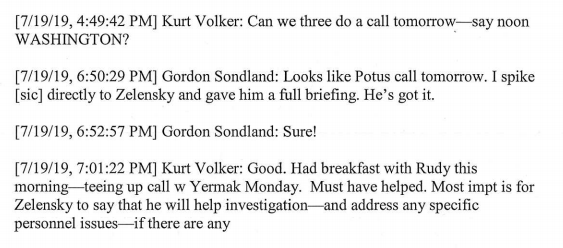
July 18, 2019: On a video conference call with the National Security Council, a person on the call (speaking off-screen) says that her boss at the White House budget office has ordered her not to approve any additional aid funds for Ukraine until further notice, Taylor later testifies. The off-screen person speaking on the call says that her boss was acting on orders from President Trump, through White House chief of staff Mick Mulvaney. This same episode is mentioned in the whistleblower’s complaint.
Volker learns of the freeze that day. In meetings on July 23 and 26, OMB officials explicitly say the instruction comes directly from the President.
July 19, 2019: Volker has breakfast with Giuliani and Lev Parnas, who is serving as a middleman in Giuliani’s Ukraine efforts. Volker pushes back on the conspiracy theories about Biden and 2016 that Giuliani has been floating, according to Volker’s testimony.
July 20, 2019: Danyliuk, the Ukrainian national security secretary, tells Taylor in a call that Zelensky does not want to be used as a pawn in a U.S. re-election campaign.
July 21, 2019: In the text thread with Volker and Sondland, Taylor raises Zelensky’s concern “about Ukraine being taken seriously, not merely as an instrument in Washington domestic, reelection politics.” Sondland responds: “Absolutely, but we need to get the conversation started and the relationship built, irrespective of the pretext. I am worried about the alternative.”
July 25, 2019: The day of Trump’s call with Zelensky, in which he repeatedly pressures the Ukrainian president on the investigations.
Hours before, Volker texts Zelensky foreign policy aide Andrey Yermak. He proposes that if Zelensky can convince Trump he will “investigate” to “get to the bottom of what happened” in 2016, then Zelensky will get a meeting with Trump.
After the call between Trump and Zelensky, Yermak texts Volker: “Phone call went well.” He pushes to confirm a date for Zelensky and Trump’s meeting.
July 26, 2019: The whistleblower pens a memo based on a conversation with an unidentified official about Trump’s Zelensky call and the White House’s initial reaction to it.
Volker goes to Kyiv for a meeting, alongside Sondland and Taylor, with President Zelensky. Taylor later recalls that Zelensky says he was happy with the call but that the leader does not elaborate. Zelensky asks about meeting Trump in the Oval Office as Trump has previously promised. Per the whistleblower’s complaint, readouts of the meeting indicated that Volker and Sondland “provided advice to the Ukrainian leadership about how to ‘navigate’ the demands that the President had made of Mr. Zelensky.”
Sondland calls Trump directly in a restaurant in Kyiv. According to a U.S. embassy staffer who heard the conversation, Trump asks Sondland if Zelensky is “gonna do the investigation?” and Sondland replies that “he’s gonna do it.” Sondland later says he has no reason to doubt the staffer’s recollection.
“In the days following the phone call”: According to the whistleblower, senior White House officials intervened to “lock down” records of the call.
“The week after the call”: According to a subsequent New York Times report, the whistleblower delivered an anonymous complaint to the CIA’s general counsel, who then learned that “multiple people,” in the Times’ words, had raised concerns about Trump’s call. Per the Times, the general counsel, Courtney Simmons Elwood, subsequently contacted a deputy White House counsel, John Eisenberg, and others, per standing procedure.
Aug. 2, 2019: Giuliani meets with Yermak in Madrid, Spain.
Around Aug. 7, 2019: While giving Volker and Sondland a readout of his meeting with Yermak, Giuliani says that Zelensky needs to issue a statement on investigating corruption and that he discussed this with Yermak, according to Volker’s testimony.
Aug. 9, 2019: After a call between Giuliani and Yermak, Volker tells Giuliani that he’d heard Yermak was “pleased with your phone call” and that Yermak “mentioned [Zelensky] making a statement.” Volker asks for, and Giuliani agrees to, a phone call “to make sure I advise Z correctly as to what he should be saying?”
In separate texts later in the day, Sondland informs Volker that “Morrison” — presumably Tim Morrison, senior director for European and Russian affairs on the National Security Council — is ready to get dates for a Zelensky-Trump meeting “as soon as Yermak confirms.” Asked how he “sway[ed] him, Sondland replies that he thinks Trump “really wants the deliverable.”


Later, Sondland proposes that “To avoid misunderstandings, might be helpful to ask Andrey for a draft statement (embargoed) so that we can see exactly what they propose to cover.” Volker agrees.

Aug. 10, 2019: Yermak tells Volker that Zelensky is willing to make a statement — “I think it’s possible to make this declaration and mention all these things,” he writes — but first, they want “a confirmation of date” for Zelensky’s meeting with Trump. Volker agrees, and proposes to “iron out statement and use that to get a date and then PreZ can go forward with it?” Yermak agrees.
Then, Yermak spells out explicitly what Ukraine will provide: a public announcement of investigations into Trump’s priorities — “Burisma and election meddling.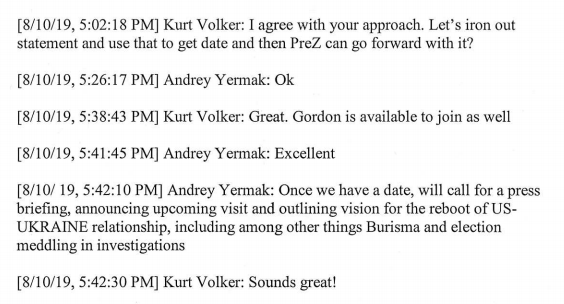
Aug. 12, 2019: A whistleblower connected to the intelligence community sends a “disclosure intended for Congress” to the Intelligence Community Inspector General (ICIG), according to House Intelligence Committee Chairman Adam Schiff (D-CA). The IG, Michael Atkinson, has a two-week period to determine if the complaint is of “urgent concern.” Sometime before making this complaint, the whistleblower had reached out to an aide on the House Intelligence Committee with details of his complaint, the New York Times later reported. The aide advised the whistleblower to get a lawyer and make a formal complaint with the ICIG.
Aug. 13, 2019: Volker drafts, and Sondland approves, a draft statement for Ukraine to announce that it is investigating Burisma, as well as the 2016 U.S. elections.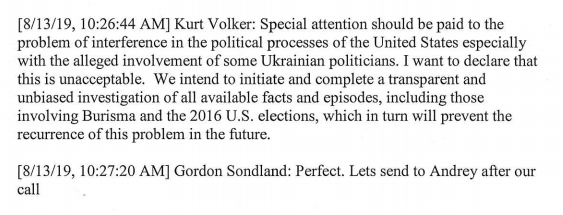
Aug. 14, 2019: Per The New York Times’ reporting, CIA General Counsel Courtney Simmons Elwood and deputy White House counsel John Eisenberg take the whistleblower’s initial anonymous complaint (the one he made to Elwood) to the head of the Justice Department’s national security division, John Demers. Eventually, per the Times, deputy attorney general Jeffrey Rosen and Justice Department criminal division head Brian Benczkowski get “looped in.” Attorney General William Barr “learn[s] of the allegations around that time,” the Times reported.
Aug. 16, 2019: Joseph Maguire is named acting director of national intelligence. Yermak shares with Volker a draft “statement” about investigating corruption. The draft does not mention the 2016 U.S. election or Burisma specifically, according to Volker’s testimony.
Aug. 17, 2019: In texts, Sondland and Volker confirm the state of play: The Trump administration wants a commitment from Ukraine to investigate 2016 election meddling and “Boresma” [sic].

Ukraine ultimately refuses to add specific mention of 2016 or Burisma to the draft statement and the idea is dropped, according to Volker’s testimony. Volker claims that he was in touch with Secretary of State Mike Pompeo and several White House officials about these conversations.
Aug. 22, 2019: Morrison tells Taylor, referring to the still-stalled Ukraine aid, that the “President doesn’t want to provide any assistance at all,” Taylor later testifies.
Aug. 26, 2019: Atkinson deems the complaint of “urgent concern.” In accordance with procedure, he then sends the complaint to acting DNI Joseph Maguire. Maguire gets a one-week period to pass the information on to the congressional intelligence committees.
“Upon reviewing the complaint,” Maguire later tells the House Intelligence Committee, his office sees that the allegations were based in part on the conversation between Trump and Zelensky and reaches out to the White House Counsel’s Office. “We were advised that much of the information in the complaint was in fact subject to executive privilege,” he tells the committee. Subsequently, Maguire’s office and the ICIG go to the Justice Department’s Office of Legal Counsel for an opinion on whether the complaint is considered an “urgent concern” that must be shared with Congress. OLC says it does not meet that criteria.
Aug. 29, 2019: In texts, Yermak raises concerns with Volker after reading a Politico article about how “the Trump administration is slow-walking $250 million in military assistance to Ukraine,” in the report’s words. “Need to talk with you,” he tells Volker.
At Bolton’s request, Taylor sends a cable to Pompeo describing the “folly” of withholding military aid from Ukraine, Taylor later testifies.
Aug. 30, 2019: Taylor informs Volker via text that Trump has canceled his trip to Warsaw, Poland — and thus, his planned meeting with Zelensky. “Hope VPOTUS keeps the bilat — and tees up WH visit…” Volker responds.
Sept. 1, 2019: Taylor texts Sondland raising concerns that the Trump administration is making security assistance funds conditioned upon politicized investigations. Rather than respond via text, Sondland tells Taylor to “call me.”‘

In the ensuing call later described by Taylor, Sondland says that Trump wants Zelensky to announce a probe of Burisma, and of alleged Ukrainian interference in the 2016 U.S. election. “Everything,” Sondland told Taylor, is dependent on such an announcement — including security aid for Ukraine.
Meanwhile, Pence and Zelensky meet in Warsaw. The next day, asked by a reporter if America’s hold-up on sending aid to Ukraine had do with efforts “to try to dig up dirt on the Biden family,” Pence says no, then adds: “we discussed America’s support for Ukraine and the upcoming decision the President will make on the latest tranche of financial support in great detail.”
As President Trump “had me make clear,” Pence adds, “we have great concerns about issues of corruption.” Later, Pence says he told Zelensky that “I would carry back to President Trump the progress that he and his administration in Ukraine are making on dealing with corruption in their country.”
Sept. 2, 2019: The deadline for Maguire to hand over the document to the committees comes and goes. He does not hand over the complaint.
Sept. 7, 2019: On a phone call with Sondland, Trump insists that Zelensky should personally announce the investigations of Biden and the 2016 U.S. election, according to Morrison, to whom Sondland relayed the contents of the call. Sondland tells Taylor the following the day that Sondland has told Zelensky and Yermak that the military aid would be at a “stalemate” unless Zelensky agrees to make a public statement.
Sept. 8, 2019: Taylor makes his concerns more explicit in a text: “The nightmare is they give the interview and don’t get the security assistance,” he says. “The Russians love it. (And I quit.)”

In a phone call, Sondland tells Taylor that Trump is a businessman, and that businessmen ask others to provide what they owe before businessmen sign checks, Taylor later testifies.
Sept. 9, 2019: Continuing over text, Taylor keeps up his argument: “With the hold [on military assistance], we have already shaken their faith in us. Thus my nightmare scenario.” He adds a few minutes later: “Counting on you to be right about this interview, Gordon.” Sondland responds “I never said I was ‘right’. I saw we are where we are and I believe we have identified the best pathway forward.”
Taylor, responding to Sondland, makes his concern yet more explicit: “As I said on the phone, I think it’s crazy to withhold security assistance for help with a political campaign.” Sondland objects, asserting that Trump “has been crystal clear no quid pro quo’s of any kind.” Then, he takes the conversation off of the written record: “I suggest we stop the back and forth by text.”
According to the New York Times and Wall Street Journal, Sondland called President Trump before rejecting Taylor’s claim of a quid pro quo, and Sondland himself claimed in his testimony to have called Trump before replying to Taylor — but subsequent reporting has led to doubt as to whether this call occurred at all.
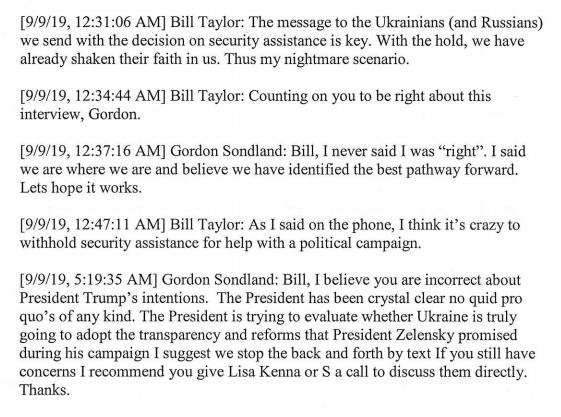
The same day, Atkinson sends a letter to the House Intelligence Committee alerting its members to the existence of the whistleblower complaint. Per Schiff, this is the first they ever heard of the document. Three House committees announce an investigation into whether Giuliani is strong-arming Ukraine into helping Trump’s reelection campaign. Schiff questions whether Maguire has bucked the law and withheld the complaint.
Sept. 10, 2019: Schiff writes to Maguire demanding a copy of the complaint and related documents.
Sept. 11, 2019: The White House releases the nearly $400 million in military aid and another for Ukraine that it had come under bipartisan pressure for withholding.
Sept. 13, 2019: Maguire rejects Schiff’s request after consulting with the Department of Justice, so Schiff goes public with the whole situation, sending a letter and subpoena to the Maguire’s office. Schiff says that if Maguire does not comply with the subpoena by Sept. 17, he will have to come before the committee himself on Sept. 19.
Sept. 17, 2019: Maguire misses the deadline to comply with the Intelligence Committee’s subpoena. His general counsel, Jason Klitenic, says that Atkinson was wrong and that the whistleblower’s complaint did not meet the “urgent concern” threshold. He also says that it is “premature” and too short notice for Maguire to appear before the committee on Sept. 19. In a letter later released by the Intelligence Committee, Atkinson tells Congress on this day that he is having a “disagreement” with Maguire about the whistleblower complaint, and that the acting DNI will not “authorize” him to convey even general information about it.
Sept. 18, 2019: Pence and Zelensky talk on the phone “to follow up on their productive September 1 meeting in Warsaw,” according to a White House readout, and to discuss Zelensky and President Donald Trump’s upcoming meeting at the U.N. General Assembly. “It was a very positive call,” according to Pence’s Russia adviser Jennifer Williams’ congressional testimony. The call includes “the Vice President reiterating the release of funds and asking a bit more about, you know, how Zelensky’s efforts were going,” according to Williams. Pence and Zelensky do not discuss any specific investigations, and Pence tells the Ukrainian leader that Trump “would be eager to hear about President Zelensky’s progress in his reform agenda,” per Williams.
Also, Schiff says that Maguire agreed to testify in an open session before the committee on Thursday, Sept. 26.
Sept. 19, 2019: Atkinson has a closed-door meeting with the Intelligence Committee. He declines to give details on the complaint. The Washington Post and New York Times both report later this night that the whistleblower complaint involves Ukraine. Giuliani goes on CNN for a frantic interview with host Chris Cuomo, during which he admits that he asked the Ukrainian government to investigate Hunter Biden.
Sept. 21, 2019: Giuliani calls Volker. Volker doesn’t return the call.
Sept. 21, 2019: Biden calls for the release of the call transcript and whistleblower testimony.
Sept. 22, 2019: Trump admits that Joe Biden, Hunter Biden and “corruption” came up during his call with Zelensky. Secretary of State Mike Pompeo and Treasury Secretary Steve Mnuchin say that it would be “inappropriate” to release a transcript of the call, though Trump says he’d “love” to release it but that he has to be a “little bit shy” about it. Schiff says that impeachment may be the “only remedy” if the allegations about the conversation are true; House Speaker Nancy Pelosi (D-CA) threatens a “whole new stage of investigation” if the administration continues to muzzle the whistleblower. According to Volker, Pompeo tells Volker that Giuliani — who has also texted Volker — wants the State Department to confirm that State set up his meeting with Yermak. Volker informs Pompeo the Department issued that confirmation back in August and Pompeo asks Volker to send the statement to Giuliani, which he does.
Sept. 23, 2019: Three House committees threaten to subpoena the State Department for withholding information on Giuliani’s role in strong-arming Ukraine.
Sept. 24, 2019: Trump confirms reports in the Washington Post that he told acting OMB director Mick Mulvaney to withhold hundreds of millions in aid from Ukraine just days before the call with Zelensky, but says that it was unrelated to Biden. House Democrats signal a growing inclination for impeachment proceedings, with Pelosi working the phones and holding meetings with committee chairs and the general caucus. Democrats contemplate creating a special committee to probe the situation. At 5 p.m. that day, House Speaker Nancy Pelosi (D-CA) announces her support of an impeachment inquiry, galvanizing House Democrats.
Sept. 25, 2019: The White House releases a memorandum of Trump and Zelesnky’s July 25 call.
Also, Trump and Zelensky meet face-to-face for the first time on the sidelines of the U.N. General Assembly.





